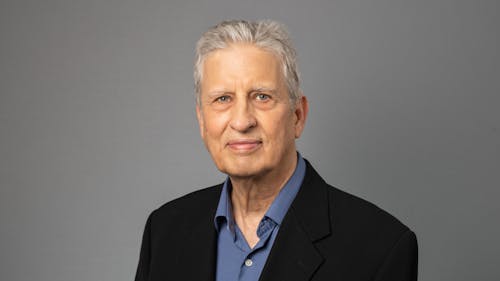U. professor wins Rollo May Award for psychology, phenomenology studies

Louis Sass, a distinguished professor in the Department of Clinical Psychology, recently received the Rollo May Award from the Society for Humanistic Psychology, the 32nd division of the American Psychological Association, according to a press release.
The Rollo May Award recognizes a recipient who has contributed and participated in independent exploration in the humanistic psychology field.
To be nominated for the Rollo May Award, candidates must be nominated by a member of the Society for Humanistic Psychology. The awards committee and the executive committee then evaluate all nominees and their work in humanistic psychology to determine their aptitude for the Society's 10 awards, according to the Society's award guidelines.
The Daily Targum spoke with Sass about his research and the significance of the award. He said that his research centers around philosophical analysis of the experiences of people diagnosed with severe mental conditions, which falls within the psychological field of phenomenology.
Sass said he and other researchers in the discipline examine theories put forth by philosophers like Edmund Husserl, Maurice Merleau-Ponty and Jean-Paul Sartre.
Furthermore, Sass said that in his research, he argues that psychological discourse includes misguided perceptions of dementia and regression. He said that the study of how such symptoms express themselves in the behavior of an individual with schizophrenia is more intricate and elaborate than currently accepted approaches suggest.
"I was always interested in trying to understand points of view that might be very different from the standard point of view," he said. "So, people who had the most severe kinds of alterations of their experience were the most fascinating to me."
Sass said that during his graduate years at the University of California, Berkeley, he realized that phenomenology was considered a niche subject area in academic psychology departments in the U.S., so he largely pursued independent research in the discipline.
During his clinical internship at Weill Cornell Medical Center, Sass said he interacted with patients with diverse medical histories. In conjunction with this experience, he found that he disagreed with traditional psychological perspectives of schizophrenia.
He added that schizophrenia is a spectrum of symptoms, with different presentations and experiences, as opposed to a single, uniform disorder.
"I feel (the Rollo May Award is) a recognition that my work has had impact and has been appreciated and has maybe changed the minds of certain people about the importance of studying subjectivity and also about the specific nature of the alteration of normal subjectivity that occurs, especially in what people talk about sometimes as the ‘schizophrenia spectrum,'" he said.
Sass said that he will attend the Society's 17th Annual Conference at the end of March to receive the award in Ann Arbor, Michigan. Award winners are required to accept distinctions in person, per award guidelines.
Sass said that after he receives the award, he intends to continue developing the self-disorder theory, a theory on schizophrenia he developed alongside Josef Parnas, a professor emeritus in the Department of Clinical Medicine at the University of Copenhagen in Copenhagen, Denmark.
He said that he is reworking this theory with Jasper Feyaerts, an assistant professor in the Department of Experimental Clinical and Health Psychology at Ghent University in Ghent, Belgium.
Sass said that he views his academic career as interdisciplinary due to how he merges psychology, psychiatry, philosophy and literature into his work.
"So, the mental health, together with the philosophical (and) the phenomenologist — who are, I think, indispensable for doing the study of mental disorder in a sophisticated and scientifically adequate way — together with literary and cultural studies … So, interdisciplinarity has been the main feature of my work, I think, and also the source of its originality," he said.



